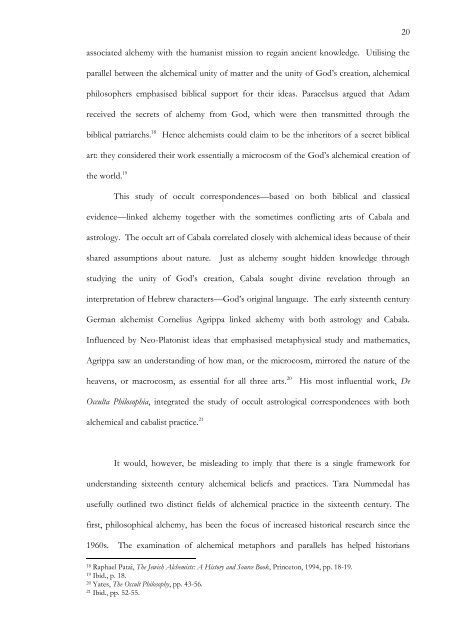The Alchemical Patronage of Sir William Cecil, Lord Burghley
The Alchemical Patronage of Sir William Cecil, Lord Burghley
The Alchemical Patronage of Sir William Cecil, Lord Burghley
Create successful ePaper yourself
Turn your PDF publications into a flip-book with our unique Google optimized e-Paper software.
associated alchemy with the humanist mission to regain ancient knowledge. Utilising the<br />
parallel between the alchemical unity <strong>of</strong> matter and the unity <strong>of</strong> God‘s creation, alchemical<br />
philosophers emphasised biblical support for their ideas. Paracelsus argued that Adam<br />
received the secrets <strong>of</strong> alchemy from God, which were then transmitted through the<br />
biblical patriarchs. 18 Hence alchemists could claim to be the inheritors <strong>of</strong> a secret biblical<br />
art: they considered their work essentially a microcosm <strong>of</strong> the God‘s alchemical creation <strong>of</strong><br />
the world. 19<br />
This study <strong>of</strong> occult correspondences—based on both biblical and classical<br />
evidence—linked alchemy together with the sometimes conflicting arts <strong>of</strong> Cabala and<br />
astrology. <strong>The</strong> occult art <strong>of</strong> Cabala correlated closely with alchemical ideas because <strong>of</strong> their<br />
shared assumptions about nature. Just as alchemy sought hidden knowledge through<br />
studying the unity <strong>of</strong> God‘s creation, Cabala sought divine revelation through an<br />
interpretation <strong>of</strong> Hebrew characters—God‘s original language. <strong>The</strong> early sixteenth century<br />
German alchemist Cornelius Agrippa linked alchemy with both astrology and Cabala.<br />
Influenced by Neo-Platonist ideas that emphasised metaphysical study and mathematics,<br />
Agrippa saw an understanding <strong>of</strong> how man, or the microcosm, mirrored the nature <strong>of</strong> the<br />
heavens, or macrocosm, as essential for all three arts. 20 His most influential work, De<br />
Occulta Philosophia, integrated the study <strong>of</strong> occult astrological correspondences with both<br />
alchemical and cabalist practice. 21<br />
It would, however, be misleading to imply that there is a single framework for<br />
understanding sixteenth century alchemical beliefs and practices. Tara Nummedal has<br />
usefully outlined two distinct fields <strong>of</strong> alchemical practice in the sixteenth century. <strong>The</strong><br />
first, philosophical alchemy, has been the focus <strong>of</strong> increased historical research since the<br />
1960s. <strong>The</strong> examination <strong>of</strong> alchemical metaphors and parallels has helped historians<br />
18 Raphael Patai, <strong>The</strong> Jewish Alchemists: A History and Source Book, Princeton, 1994, pp. 18-19.<br />
19 Ibid., p. 18.<br />
20 Yates, <strong>The</strong> Occult Philosophy, pp. 43-56.<br />
21 Ibid., pp. 52-55.<br />
20















